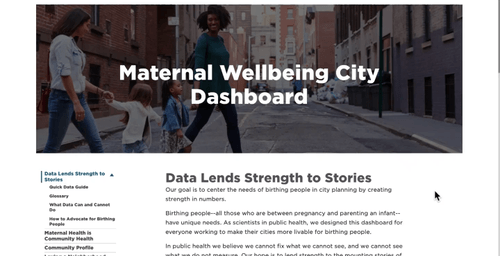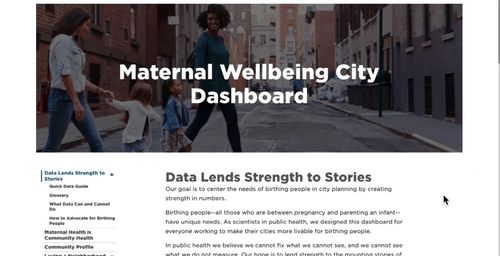By Yara Altaher, MPH
No American politician would ever come out against motherhood. Allocating money for moms, however, can be another matter. Often advocates and leaders lack the information needed to make a case for centering people giving birth in local planning, policymaking, or programming — even though maternal health is a bellwether for societal health overall. Fundamentally, policymakers cannot address what they cannot see, and they cannot see what they cannot measure.
To solve this challenge, the Delivery Decisions Initiative (DDI) at Ariadne Labs has developed the Maternal Wellbeing City Dashboard as a part of the Safer Childbirth Cities Initiative. Designed for cities and communities, the dashboard uses curated, publicly available national data to provide a snapshot of community livability relevant for women and birthing people.
The dashboard displays local information about maternal and child health services, housing, transit systems, education and job opportunities, open spaces, and security. This approach uses data to lend power to the lived experiences of advocates, service providers, local public officials, and community members. Even if someone does not appear to work directly in the maternal health space, they usually serve women and birthing people in some capacity and can use the dashboard to understand how maternal issues intersect with their own experiences and work.
Pilot-tested in three cities — New York City, Pittsburgh, and Tulsa — the dashboard has been found to be feasible and acceptable to users in different types of cities and roles. Our collaborators valued the breadth of data available that was specific to their city and thought that this would save them time and energy in building a compelling, data-driven case for their work.
Our white paper, “Fostering Livable Communities for Birthing People,” outlines how we designed and tested the Maternal Wellbeing City Dashboard by connecting publicly available data with evidence for impact and actionable levers for change for stakeholders at the local level.
How The Dashboard Can Be Used
With the dashboard, users build knowledge that can enhance their work to improve community livability for women and birthing people through public awareness, programs, partnerships, and policies. The dashboard can spark discussions about the current state of maternal health with community members and colleagues, target policies and programs across domains that impact women and birthing people, and develop coalitions to address their needs. The dashboard also helps to highlight gaps that exist between current publicly available data and the ideal data needed to promote equitable maternal health. Acknowledging these gaps can aid those advocating for organizations to be accountable for better, anti-racist data collection in the future.
The opportunities to enable cross-sector collaboration are among the most exciting: For people new to maternal health and advocacy, the dashboard can be a valuable tool for learning about the issues facing women and birthing people in their community and for identifying ways to provide support. For community advocates, the dashboard can serve as a roadmap to link their expertise and actions with other local advocates and stakeholders. Community groups can use the information to press legislators to develop family-friendly policies and then help civil servants and service providers implement those policies and programs. Legislators can use the information to shape policies and priorities, such as connecting housing, transportation and open space creation with maternal health, creating a more holistic approach for government action. For maternal health advocates, the dashboard can uplift their lived experiences and help expand the coalition supporting their existing work.
No matter their role — whether a woman or birthing person, health worker, community member, elected official — our testers found something useful for their own work and gained perspective on how those in different roles could also contribute.
Future Impact of the Dashboard
The Maternal Wellbeing City Dashboard can serve as a catalyst for actionability through data and narrative. Our hope is that dashboards will be developed and scaled for additional cities and communities, based on what we have learned in Tulsa, New York City, and Pittsburgh. Across the nation, the dashboards can serve as a digital organizing tool connecting users to augment and mobilize collective impact for maternal health in a sustainable, data-informed way. According to the project’s Research Manager Amanda DiMeo, “Our vision is for women and birthing people in every city in the United States to benefit from this capability, ultimately ensuring that we center birthing people in city planning and policymaking.”
NOTE: We use the language “women and birthing people” whenever possible to be inclusive and affirming across gender identities (cis women, trans men, and people who are non-binary or gender-fluid) and intersex people. We acknowledge the terms “maternal,” “moms” and “motherhood” are gendered and recognize the spectrum of gender identities that birthing people hold.
Yara Altaher, MPH, is a Research Assistant on the Delivery Decisions Initiative (DDI) program team, where she provides support to the Cities Challenge, Expecting More, and TeamBirth projects. For the Cities Challenge, she helps with the design of a tool to inform U.S. cities in maternal health policy making and implementation, and as part of Expecting More, she assists in the planning and management of other narratives centered on growing families with dignity. On TeamBirth, Yara contributes to ongoing solution and community engagement design. She earned her BS in Public Health Sciences from the University of California, Irvine, and her MPH at the Boston University School of Public Health.
The development of the Maternal Wellbeing City Dashboard was supported by funding from Merck through its Merck for Mothers program and is the sole responsibility of the authors. Merck for Mothers is known as MSD for Mothers outside the United States and Canada.
Illustration by pticelov/iStock.





